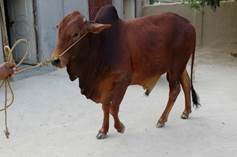
Insist on Using Semen from Disease-free and Progeny Tested Bulls for Artificial Insemination
Artificial Insemination
While breeding your cows employing artificial insemination technique, as a consumer it is your right to demand that semen from a disease-free and progeny tested bull to be used. This is because you want your herd to progress genetically to more milk every generation. This is largely determined by the ‘bull’ used in the breeding program. Compared to natural service by a bull, the conception rate with AIArtificial insemination is a scientific method of making female animal pregnant by putting semen inside her uterus or cervix is substantially lower but the real gain is in better-performing new generation heifers. Hence always insist on knowing more about the ‘bull’ that are being used for breeding in your farm.
The semen supplying companies are duty-bound to provide you following information.
- If the bull has been ‘progeny tested’ and if yes what is its ‘PTAPredicted Transmitting Ability: Average genetic value if certain traits like milk production transmitted by parent animal to its offspring.’ and what reference population has been used
- If the bull has been tested for ‘genetic disorders’ if, yes, what diseases and results
- If the bull has been tested for important sexually transmissible diseases, if yes, when was the last test done and what were the results
What is PTA?
This index gives an idea about the genetic value of a bull. Based on the performance of progeny, the breeding value of a bull for a trait can be calculated. For example, if from data it becomes evident that daughters of a bull ‘A’ on an average (after adjusting for other effects, such as, nutrition, environment, etc.) have produced 500 kg more milk then the bull A will be said to have an estimated breeding value of 1000 kg. Similar values for other traits such as milk fat, milk protein can also be calculated based on bull’s daughters’ data. The reason for doubling the expected progeny performance is that only half set of these genes will be from bull whereas other half will be from dam side. The estimated breeding values divided by 2 is used to predict the performance of future offspring relative to the population mean and termed ‘Predicted Transmitting Ability’ (PTA).
For example, in above case bull ‘A’ will have PTA of 500 kg. In simple terms, this means that if semen of this bull is used in a population the daughters will be expected to produce 500 kg more milk than the average milk yield of the reference population. Similarly, if there is another bull that has PTA of 400 the interpretation will be that daughters of the bull ‘A’ will produce 100 kg more milk per mature lactation than the daughters of the bull ‘B’.
So the farmer must ask for PTA of all the bulls whose semen is being used in the area and then select the best amongst the lot. It is always safer to also consider PTA for milk fat as there is no point in selecting a bull that transmits gene for more volume but less fat content. In case the semen suppliers are not ready to give PTA values, it should be presumed that the bull has been selected based on only dam’s milk hence it will be impossible to predict whether there will be improvement in daughters. Often semen producing companies use term ‘Proven SireWhose genetic value is proven through genomic or progeny testings’, which has not meaning. Now bulls are also being marketed as ‘genomic tested’. This is based on presence of nucleotide polymorphisms also called single nucleotide polymorphism (SNP) as marker for high milk, fat yield. These are quite accurate predictors but in India, reference population data is not available and there is a lot of variation between the population it is always safer to insist on use of ‘progeny test bull’.
Important genetic disorders for which bull should be tested and declared free:
There are various diseases that are due to defective genes and can be transmitted to progeny if present in dam or sire. It is always safer to test even cows but since bulls in AI program are used on a large population these must be tested and declared free. In India the ‘Central Monitoring Unit’ of the Department of Animal Husbandry, Government of Maharashtra officially scrutinize such data and officially announce bulls in AI program as free from such diseases. But, this is not yet mandatory and enforced in right spirit. Local breeders’ bulls used commercially for natural services and unregistered semen suppliers don’t follow these guidelines. The farmer therefore must insist that the semen their AI technician is using is from a registered supplier and data about the bull testing is available. In India bulls should be tested against following genetic diseases.
- Dumps (Deficiency of Uridine Monophosphate Synthase)
- Blad (Bovine Leukocyte Adhesion Deficiency)
- Citrullinemia
- Factor XI Deficiency
Farmers and their organizations should ensure that the semen used in breeding their cows are free from these diseases. If you have a breeding bull and want to get this test done, in the following labs facilities are available.
Sample to be collected: Blood with anticoagulant – The vials can be obtained from any Pathology Laboratory
- Department of Animal Genetics and Breeding, Bombay Veterinary College, Parel, Mumbai 400 012; contact number 022 24130162
- GeneOmbio Technologies, VEDANT, S. No. 39/3, H. No. 1043, Yogi Park, Off Mumbai – Bangalore Expressway, 411 045, Baner Pune. Phone No : 9960000984
- Sandor Animal Biogenics Pvt. Ltd. # 8-2-326/5, Road No.3, Banjara Hills, Hyderabad – 500 034. A.P., INDIA.Telephone: +91–40 2335 7048, 2335 4824; Mobile: +91 73 82 62 18 17; Fax: +91 –40 2335 7046; E-mail: info@sandorbiogenics.co.in
Read: Important sexually transmitted diseases
